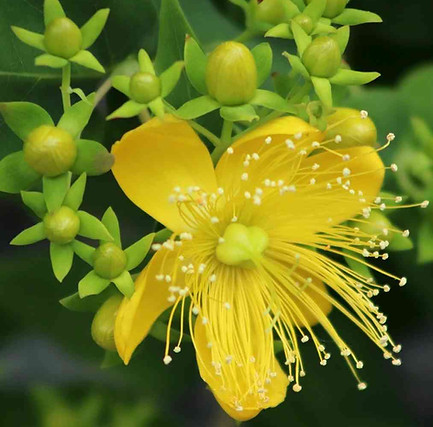
Macerated Oils
St. John’s Wort

Botanical name:
Family:
Common names:
Geographic origin:
Cultivation:
Extraction method:
Place of manufacture:
Date of manufacture:
Plant parts used:
Base oil used:
Shelf life:
Hypericum perforatum L.
Hypericaceae
Perforate St John's-wort
South-West Turkey
Wild harvested
Maceration
Gökova, Turkey
August 2021
Flowers
Cold pressed olive or sesame oil
2 years





Description
St. John's wort is a perennial shrub which has yellow, star-shaped flowers and five petals. It requires sunny and well-drained areas and can grow up to 100 cm. Although St. John’s wort is native to Europe, it can be found in many places of the world including, North and South America, Australia, New Zealand, and Eastern Asia. It is believed that the St. John's wort is named as such because it is commonly harvested in late June, around St. John's Feast Day on 24 June and is hung on doors to ward off evil spirits and to safeguard against harm and sickness.
The flowers and leaves of St. John's wort contain active ingredients such as hyperforin and hypericin. When flower buds or seed pods are crushed, a reddish/purple liquid is produced. The red colour of macerated oil is derived from the degradation of hypericin due to exposure to sunlight. St. John’s wort was thought to have medical properties since classical antiquity and has been used in traditional European medicine for centuries.
Goya Botanicals St. John’s Wort Macerated Oil is handcrafted by infusing delicately harvested flowers into cold pressed extra virgin olive oil or cold pressed sesame oil.
Uses & Benefits
Macerated oil or ointment prepared with the flowering aerial parts of St. John's wort have been used in the management of a wide range dermatological problems including superficial wounds and burns, bruises, contusions and many others in the worldwide traditional medicines(1). Historically it is well noted by the ancient Greek physicians Pliny and Hippocrates.
According to the European Medicines Agency the traditional cutaneous use of St. John's wort macerated oil is described for the symptomatic treatment of minor inflammations of the skin and subcutaneous tissue disorders including first degree burns and sunburn as well as musculoskeletal disorders such as myalgia and rheumatism(2). Several studies have also revealed antimicrobial(3) and antibacterial(4) activity of St. John's wort macerated oil.
In modern medicine extracts of St. John's wort are prescribed widely for the treatment of anxiety, mood disorders and depression(5).
Technical Data Sheet
References & Disclaimer
-
Yücel, A., Kan, Y., Yeşilada, E., Akın, O. (2017). Effect of St.John's wort (Hypericum perforatum) oily extract for the care and treatment of pressure sores; a case report. J. Ethnopharmacol. Jan 20;196:236-241.
-
European Medicines Agency 2009 Assessment Report on Hypericum perforatum L.,herba.
-
Orhan, I.E., Kartal, M., Gülpinar, A.R., Cos, P., Matheeussen, A., Maes, L., Tasdemir, D.,2013. Assessment of antimicrobial and antiprotozoal activity of the olive oil macerate samples of Hypericum perforatum and their LC-DAD-MS analyses. Food Chem. 138, 870–875.
-
Orhan, I.E., Kartal, M., Gülpinar, A.R., Yetkin, G., Orlikova, B., Diederich, M., Tasdemir, D, 2014. Inhibitory effect of St. John's Wort oil macerates on TNFa-induced NFkB activation and their fatty acid composition. J. Ethnopharmacol. 155, 1086–1092.
-
Linde, K., Berner, M.M., Kriston, L. (2008). St John's wort for major depression. Cochrane Database of Systematic Reviews (4) Art. No.: CD000448.
Macerated oils are herbal liquids that might have strong chemical and biological effects.The statement above is for information purposes only. It is not intended to offer professional medical advice or treatment for any condition. Goya Botanicals shall not be responsible for any harm resulting from the use of or reliance upon this information.



.jpeg)
.jpeg)